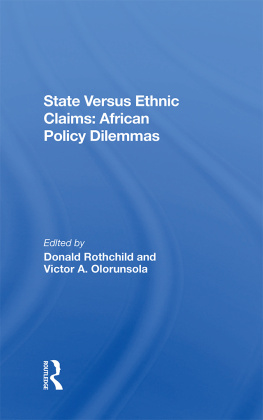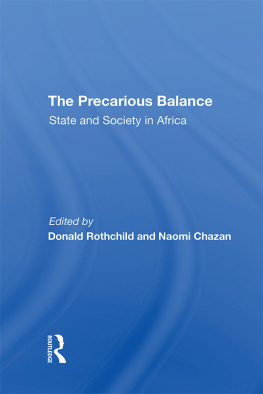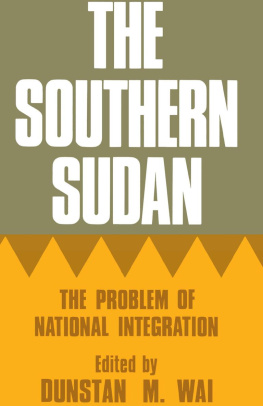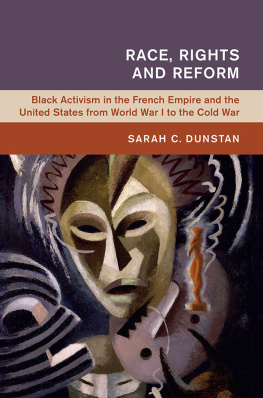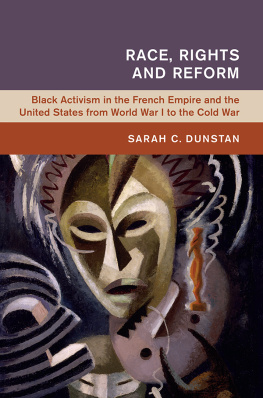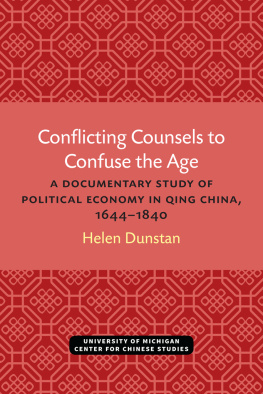State Versus Ethnic Claims: African Policy Dilemmas
Also of Interest
Women and Work in Africa , edited by Edna Bay
* Alternative Futures for Africa, edited by Timothy M. Shaw
Nigeria in Search of a Stable Civil-Military System, J. 'Bayo Adekson
Interdependence in a World of Unequals: African-Arab-OECD Cooperation for Development, edited by Dunstan M. Wai
Women in Rural Development: A Survey of the Roles of Women in Ghana , Lesotho, Kenya, Nigeria, Bolivia, Paraguay and Peru, Donald R. Mickelwait, Mary Ann Riegelman, and Charles F. Sweet
An African Experiment in Nation Building: The Bilingual Cameroon Republic Since Reunification , edited by Ndiva Kofele-Kale
African Upheavals Since Independence, Grace Stuart Ibingira
Analyzing Political Change in Africa: Applications for a Multidimensional Framework, edited by James R. Scarritt
Ethnicity in Modern Africa , edited by Brian M, du Toit
** Africa's International Relations: The Diplomacy of Dependency and Change, Ali A. Mazrui
An Anatomy of Ghanaian Polities: Managing Political Recession, 1969-1982, Naomi Chazati
U.S. Economio Power and Influence in Namibia, 1700-1982, Allan D. Cooper
The Economics of Political Instability: The Nigerian-Biafran War, E. Wayne Nafziger
Senegal: An African Nation Between Islam and the West, Sheldon Gellar
Tanzania: An African Experiment, Rodger Yeager
* Available in hardcover and paperback.
** Available in paperback only.
Westview Special Studies on Africa
State Versus Ethnic Claims: African Policy Dilemmas
edited by Donald Rothchild and Victor A. Olorunsola
How can today's independent African states preserve and enhance their coherence while accommodating the legitimate demands advanced by ethnic groups for autonomy and particular interests? This problem is critically important not only in Africa, but also in efforts to establish mutually beneficial state-ethnic relations the world over. To analyze these issues, leading African and non-African experts met in Bellagio, Italy, to address four central issues: the state and its implications for ethnicity; the claims of ethnic groups; policies to manage competing claims; and the dialectic of autonomy and control. This book, in which policy analysis is applied to the search for creative state-ethnic relationships, represents the results of their efforts.
Dr. Donald Rothchild is professor of political science, University of California at Davis. He has been visiting Fulbright Lecturer in Political Science at Makerere University, Kampala, Uganda; senior lecturer in government at the University of Nairobi, Kenya; and visiting Ford Professor of Political Science at the University of Zambia. He is author of Politics of Integration: An East African Documentary (1968) and coauthor of Scarcity, Choice and Public Policy in Middle Africa (1978).
After a long academic career that has included faculty posts at various universities, Dr. Victor Olorunsola is now chairman and professor in the Department of Political Science at Iowa State University. He has edited and contributed to The Politics of Cultural Sub-Nationalism in Africa (1972) and written Societal Reconstruction in Two African States (1977).
To Alice L. Rothchild and Katherine Bradley
First published 1983 by Westview Press, Inc.
Published 2019 by Routledge
52 Vanderbilt Avenue, New York, NY 10017
2 Park Square, Milton Park, Abingdon, Oxon OX14 4RN
Routledge is an imprint of the Taylor & Francis Group, an informa business
Copyright 1983 Taylor & Francis
All rights reserved. No part of this book may be reprinted or reproduced or utilised in any form or by any electronic, mechanical, or other means, now known or hereafter invented, including photocopying and recording, or in any information storage or retrieval system, without permission in writing from the publishers.
Notice:
Product or corporate names may be trademarks or registered trademarks, and are used only for identification and explanation without intent to infringe.
Library of Congress Catalog Card Number 82-51129
ISBN 13: 978-0-367-28873-0 (hbk)
The idea for this book can be traced to an informal brainstorming session among four very good friends -- Ali Mazrui, Victor Olorunsola, Donald Rothchild and Dunstan Wai. In a real sense, then, as editors we owe a lot to Dunstan and Ali for their intellectual stimulation and for encouraging us to pursue a follow-up to The Politics of Cultural Sub - Nationalism in Africa .
African states have had to deal with the conflicts and tensions generated by the juxtaposition, or, if you like, the interplay, between the state's claims for control over society on the one hand and the desires of various geopolitical units for autonomy and the attainment of their particular objectives on the other. Conflict and cooperation are necessary and unavoidable in societal interactions. It is equally evident that in the quest for stability, conflict and cooperation must be judiciously balanced if the interactions between states and subnational groupings are to be mutually rewarding. How can this be done? What kind of policy options are available? This volume addresses four dimensions of this complex issue we feel are critical: (1) the state and its implications for ethnicity; (2) the claims of ethnic groups; (3) the policies to manage competing claims; and (4) the dialectic of autonomy and control. Should this volume contribute in any way to African policy-makers' search for realizable ends in this area, the authors will be intensely gratified.
The Rockefeller Foundation granted us the use of the Bellagio Conference Center; the Ford Foundation, an anonymous donor, and the University of California at Davis provided financial assistance for the conference. Iowa State University contributed support services. Clearly, without the generosity of these institutions and agencies, the Bellagio Conference would not have taken place. In particular, we wish to thank the director of the Bellagio center, Roberto Celli, and his staff} Dr. Bill Carmichael of the Ford Foundation; and Dr. John Stremlau and Susan E. Garfield of the Rockefeller Foundation. The Bellagio Conference itself was exceedingly stimulating and productive, not only because of the intellectual caliber of the participants, but also because of the collegial atmosphere and attitude engendered.
Verla Schoelkoph, Lois Persinger, Virginia Lee, Cheryl Lyttle, Vickie Zinner, Brenda Peterson, Donna Hughes-Oldenburg and Michael Foley have been most supportive, efficient and tolerant in their handling of administrative and editorial matters. Robin Campbell did exemplary work in editing and typing the final manuscript. Of course, none of the individuals or organizations mentioned should be held responsible for any of the opinions expressed in this volume.

